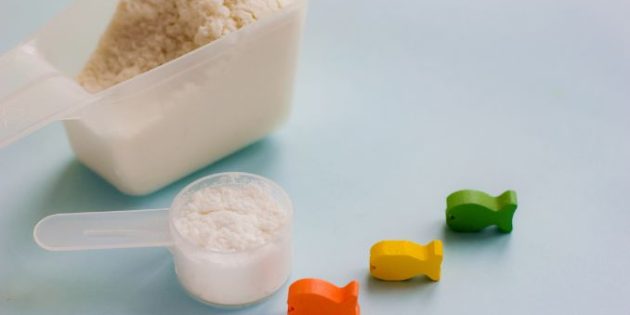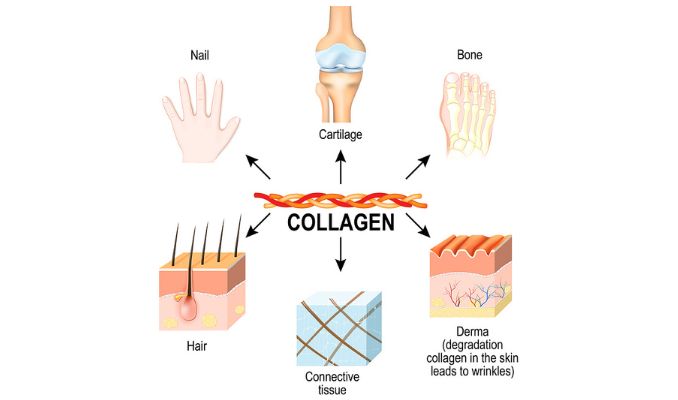Collagen is a structural protein that makes up a large percentage of the cells in our body. 30% of the protein in our bodies is collagen, making it the most abundant protein. It is part of our connective tissue that holds together skin and many other body parts. It is found in muscles, bones, tendons, blood vessels, and the digestive system. Collagen is essential for keeping your skin looking young and healthy, and losing collagen is a common part of aging. Collagen keeps skin looking young, soft, smooth, and firm. It helps skin cells renew and repair themselves and keeps the skin moist. Collagen loss begins around age 30 and becomes more severe by age 50. Some studies suggest that collagen supplements can help reverse the adverse effects of collagen loss. In this article, we will go through the common signs that you are deficient in collagen.
1. Wrinkling
As we age, collagen stores deplete, and our skin loses some of its structure. This results in the common signs of aging, including wrinkles, sagging skin, and a decrease in skin elasticity.
2. Joint Pain
Decreased collagen levels can cause stiff, swollen, and painful joints. Collagen loss in the joints can lead to increased friction between the bones and ligaments, which can be painful and progress into arthritis.
3. Sore Muscles
Our tendons and ligaments hold our muscles to bones and our bones to other bones. Tendons and ligaments are made of collagen, and as collagen fibers weaken, so as the connections between these structures. This can lead to increased friction and aching muscles. Collagen makes up a percentage of our muscle mass; as we age, we lose muscle mass, a condition called sarcopenia.
4. Cellulite
Collagen is part of your connective tissue and is important for skin elasticity, firmness, and cell renewal. When the fatty tissue layer underneath your skin pushes upward against your connective tissue, cellulite results; with age and further decreases in collagen, the skin thins further, and cellulite worsens.
5. Flat or Thin Hair
Collagen protein is found around the hair follicles. Here, small blood vessels deliver your hair’s nutrients to stay healthy. As collagen levels decline, so does the delivery of the nutrients necessary for hair growth. This results in dull, thin hair.
6. Brittle Nails
You may have heard of keratin, a protein necessary for healthy, strong nails. Collagen protein contains the amino acid proline, which is one of the building blocks of keratin.
7. Hollowed Face and Eyes
As we age, our natural glow and smooth skin deteriorate. Collagen deficiency may result in the darkening and hollowing of the area around the eyes.
8. Blood Pressure Problems
Collagen partly makes our blood vessel walls, and we experience problems regulating blood flow when it deteriorates. Usually, collagen deficiency results in abnormally low blood pressure. Some abnormally low blood pressure symptoms include headaches, chest pain, dizziness, and fatigue.
9. Decreased Bone Density
Our bones are partly made up of collagen. If we become low in collagen, we risk osteogenesis imperfecta or “brittle bone disease.”
10. Poor Gut Health and Leaky Gut
Collagen is everywhere, including the lining of your digestive tract. Collagen contains the amino acids glycine and glutamine, which are helpful for digestion and a healthy gut barrier. The right amount of collagen, glycine, and glutamine helps maintain the gut lining and increase nutrient absorption while reducing bloating. A leaky gut does not provide strong protection to prevent toxins from entering the bloodstream. A healthy gut is not only important to feel good daily but can lead to a stronger immune system.
11. Poor Appetite Control
Collagen may help decrease appetite by supporting satiating hormones. Collagen has made people feel full longer than other proteins such as whey or soy. When we feel full and satisfied, we are less likely to overeat, making collagen an important piedfort in loss and weight management.
So, how do you boost your collagen levels?
There are many non-invasive ways to increase your collagen.
- You can take collagen supplements. Supplementing with collagen has been shown to slow the appearance of wrinkles, support joint health, reduce inflammation and arthritis, increase muscle mass, harden nails, improve hair growth, reduce hair loss and slow the graying of hair. When choosing a collagen supplement, ensure you get one with several different types of collagen, as our body uses different forms of collagen for different functions. Also, consider whether or not the collagen supplement is hydrolyzed. Hydrolyzed collagen contains collagen that has been broken down into smaller molecules, making it easier and faster for your body to absorb. Make sure you always take collagen supplements under the supervision of a trusted healthcare professional.
- Massages increase collagen production. Plus, they feel great and can help reduce stress, which will help you look and feel younger.
- Hyaluronic acid is an important compound for collagen in the skin. Foods like beans, root vegetables, and soy contain hyaluronic acid. You can also find hyaluronic acid supplements.
- Studies have shown that vitamin C plays a role in protecting the skin and producing more collagen. Vitamin C can be a supplement but is easily found in foods such as citrus fruits, leafy green vegetables, papaya, strawberries, and broccoli.
- Bone broth is a common way to get collagen from food. We do not eat the same way our ancestors did, and thus it is more difficult for us to find collagen in our diet.
Collagen is an extremely important part of a well-functioning body. We hope this article enhanced your understanding of collagen and why it plays an important role in staying healthy.










